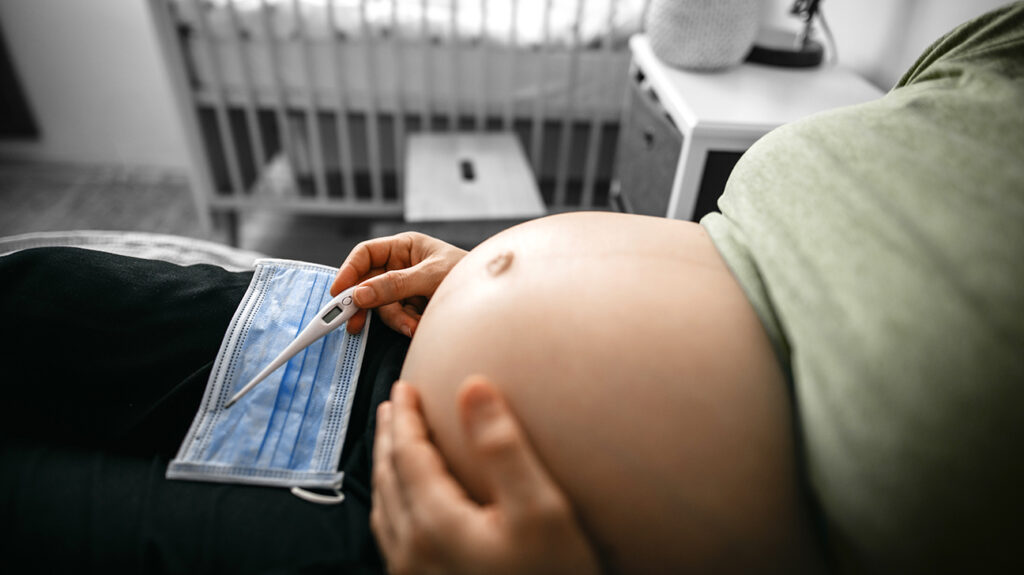Are Pregnant Women More at Risk for COVID-19?

September 10, 2020
Most pregnant women who contract COVID-19 don’t end up with a dire scenario like East Rutherford, New Jersey, resident Donna Molina, whose life was saved at Hackensack University Medical Center with 10 days of ventilator treatment in April after her baby girl was delivered two months prematurely.
But scientists are still determining whether expectant mothers face greater dangers from the virus. The latest guidance from the U.S. Centers for Disease Control and Prevention (CDC) indicates the answer may be yes.
In June, the CDC updated its advice to pregnant women regarding COVID-19, saying expectant mothers might be at greater risk for severe illness, which may also increase the risk of preterm birth. The information is based on a national report suggesting pregnant women with the novel coronavirus are more likely to be hospitalized, admitted to the ICU or need mechanical ventilation than non-pregnant COVID-19 patients.
“We think pregnant mothers are no different than the general population in terms of contracting the virus, but the physiologic changes in the pregnant patient could make them go down a negative path pretty aggressively,” says Abdulla Al-Khan, M.D., vice chairman and director of Maternal-Fetal Medicine and Surgery and co-director of the Fetal Care Program at Hackensack. “Your body is going through tremendous changes in pregnancy and your immune system is suppressed, so one always questions the progression of disease in a mother who is immune-compromised.”
No Road Map for Treatment
Donna was one of about 40 pregnant women treated for COVID-19 by Hackensack doctors in the first months of the outbreak. About 20 percent of those mothers, including Donna, required ICU care and ventilator support, and all survived.
The same basic treatment approach applies to pregnant mothers as any other COVID-19 patient: Support breathing if necessary and tame other symptoms with various medications. But women in later stages of pregnancy who require advanced care to beat the virus are delivered immediately to “decompress the belly” and ease breathing, Dr. Al-Khan says.
While much is still unknown about the risks that newborns face due to COVID-19, Dr. Al-Khan says none of the infants born to COVID-19-infected mothers at Hackensack contracted the virus.
“We watch these patients carefully and use the best science available to treat them,” he says. “We’ve been really fortunate. But there’s no road map yet for doctors in terms of managing patients with COVID-19.”
Tips to Stay Healthy
How can pregnant women reduce their risks from COVID-19? Dr. Al-Khan offers these tips:
- Limit interactions with others not in your immediate family as much as possible.
- Stay socially distant and wear a mask when in public.
- Don’t allow young children to have play dates with others.
- Wash or sanitize hands regularly, especially when away from home.
- Keep at least a 30-day supply of any medications on hand.
“You’re dealing with two lives now—yours and your unborn baby’s—so you need to be more vigilant,” Dr. Al-Khan says. “If you start feeling any symptoms, like malaise, nausea, vomiting, chills or shortness of breath—notify your doctor immediately.”
The material provided through HealthU is intended to be used as general information only and should not replace the advice of your physician. Always consult your physician for individual care.
Sources:
U.S. Centers for Disease Control and Prevention
Find a doctor near me
COVID-19 Myths 3.0

Debunk COVID-19 myths with Dr. Jacobs. Learn the truth about vaccines & more. Get reliable info & resources now.
Myocarditis, COVID-19 & the Vaccine

Understand myocarditis risks from COVID-19 and vaccines. Learn from leading cardiologists. Schedule your vaccine appointment today.
